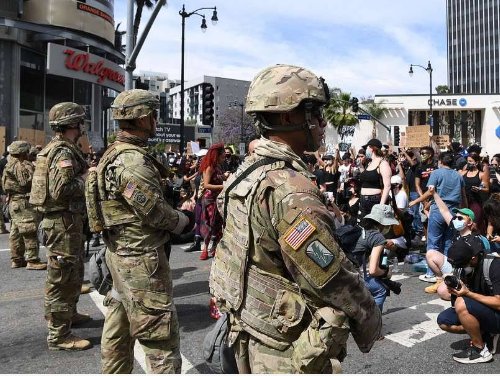This FAQ (drafted by members of the MLTF) can also be found in printable PDF format here: Illegal Orders FAQ – 11NOV2025
DoD Instruction 1325.06 permits a servicemember to possess a single copy of this document.
FAQs on refusing illegal orders
Version 2 – released November 11, 2025

- Do I have the right to refuse illegal orders?
- Yes! All members of the military have the right, and in some cases have the duty, to refuse illegal orders. Your oath is to the Constitution (which incorporates international treaties ratified by the U.S. on human rights and the law of war), not to the Commander-In-Chief or to any other individual in the chain of command.
- Under the UCMJ, a servicemember may be punished by court-martial for failure to obey any lawful general order or regulation. The UCMJ does not define what “lawful” means. The Rules for Courts-Martial say that an order is lawful, “unless it is contrary to the Constitution, the laws of the United States, or lawful superior orders or for some other reason is beyond the authority of the official issuing it.” The Rules go on to say that, “This inference does not apply to a patently illegal order, such as one that directs the commission of a crime.” Finally, the Rules say, “The lawfulness of an order is a question of law to be determined by the military judge.” That determination normally can be made only after a servicemember refuses or obeys an order, in a court martial or a war crimes tribunal.
- What are some scenarios in which I might be given illegal orders?
None of the scenarios below would necessarily involve illegal orders, but these are all actions that the Commander-In-Chief has discussed publicly as possibilities, which might involve the U.S. military, and that might lead to illegal orders. We don’t know if any of these things will happen, but you may want to think about what you would do if you were given orders to take part in any of these military actions or to take specific actions once deployed, since it may not be the deployment itself that’s illegal.
In the U.S.:
- Use of military forces to carry out deportations, removals, or detention of immigrants. (Removals to countries where those removed are likely to be tortured could violate the Convention Against Torture, to which the U.S. is a party.)
- Use of military forces against civilian protesters. (The Posse Comitatus Act prohibits the use of federal troops for domestic law enforcement, with certain exceptions, primarily in the event of an insurrection. Thus, one has an arguable duty to refuse to obey an order to assist law enforcement personnel unless there is an “insurrection.”)
Outside the U.S.:
- attacks on vessels in international or foreign waters.
- attacks on surviving crew or passengers of vessels sunk at sea.
- invasion of, or attack on, Venezuelan territory, vessels, or nationals.
- attack, invasion, or attempt to seize control of the Panama Canal by force.
- “preemptive” use of military force against China, Iran, or other countries.
- attempt to annex Greenland or to attack or invade Canada.
- use of nuclear weapons against China or another country.
- Torture or mistreatment of civilians, prisoners of war, or other detainees.
International law prohibits the use of military force except in retaliation for a military strike or in the face of an imminent military strike. The International Court of Justice has also held that the use of nuclear weapons is a violation of international law, although that ruling is not necessarily binding on US courts. Other treaties govern torture, treatment of detainees, stopping and boarding of vessels in international waters, etc.
- What are some of the reasons and ways that an order might be illegal?
For deployments within the United States, the Posse Comitatus Act of 1878 generally prohibits use of the military for policing. However, the Administration is developing ways around this law. In addition, the Insurrection Act gives the President the authority to use the military in certain circumstances to suppress any, “insurrection, domestic violence, unlawful combination, or conspiracy” that he or she determines is in violation of federal law. These legal technicalities make it difficult to tell if an order to deploy against U.S. residents is illegal.
For deployments outside the United States, the first question becomes whether such a deployment is itself illegal. Under the Constitution, only Congress has the power to declare war. Absent such a declaration, an order to deploy to war is legally questionable. In the examples above, Congress has not declared war. The Constitution reserves to Congress the authority to declare war. However, no US military action since World War II, including Korea, Vietnam, Iraq and Afghanistan, has been the result of a declaration of war and no court has found any of those illegal or unconstitutional as Presidential powers have expanded considerably over the years. As for self-defense, none of these countries have declared war against the U.S., attacked the U.S. or is preparing an imminent attack. However, an order to deploy is presumed to be lawful and the question of whether an order to deploy in the absence of a constitutionally required declaration of war can only be decided by a military judge at a court-martial.
Once deployed, the key is figuring out what a “patently illegal” order is. Prior legal cases suggest that this means any order to commit atrocities. For example, Lieutenant Calley serving in Vietnam was court-martialed for carrying out orders to kill unarmed women and children. A soldier in the Korean War was given an order to rape and steal which was found to be illegal. Under the UCMJ, murder is illegal but killing is not. And, under military rules, a military judge at a court-martial decides whether an order is legal. It is up to the individual servicemember to decide if an order to shoot unarmed civilians should be followed or is “patently illegal.”
- How can I tell if an order is illegal?
The only way to find out whether an order is legal or illegal is to obey, or refuse to obey, and see what is decided after the fact by a military court, a civilian court reviewing a military decision, or a war crimes or human rights tribunal. As a servicemenber subject to the UCMJ, you obey or disobey any order at your peril – which is, of course, one of the risks of enlistment. You can consult a civilian lawyer with expertise in military and international law, but they are very unlikely to be able to give you a definitive answer as to whether a particular order is likely to be found to be legal or illegal.
- What should I do if I think an order might be illegal?
- Know that you are not alone! Other members of the military are also thinking about these issues. Many civilian individuals and organizations support members of the military who refuse illegal orders.
- Consider making use of your command’s open door policy to respectfully discuss your concerns about the order, as it may result in you being reassigned to less objectionable duty or removed from the deployment roster.
- Be prepared! Plan ahead. Think about what you will do. Once you receive an order, you may have very little time to decide what to do. Commanders expect you to obey orders – immediately!
- Talk to a lawyer (in advance, if possible) if you think you might receive an illegal order, you aren’t sure which orders might be illegal, or you aren’t sure about your rights or what you should do.
- Be very careful about how and with whom you communicate. Don’t use military or government devices to communicate with a lawyer or counselor. You have the right to consult a civilian lawyer about your rights, but the military may try to punish free speech or research about your rights as insubordination.
- If you decide not to refuse an order, you have the right to report possible illegal orders through the use of (1) a congressional inquiry, (2) an Inspector General complaint, or the UCMJ Article 138 “redress of grievance” process.
- If this makes you uncomfortable, especially if there are some legal orders you could not in good conscience obey, you may be eligible for discharge or reassignment to noncombatant duty as a conscientious objector or other good discharge. Contact the groups listed below for counseling about this and other ways to get out of the military.
- What will happen if I obey an illegal order?
You might later be court-martialed for war crimes or charged with violations of the law of war or human rights law. Some treaties provide for “universal jurisdiction” for war crimes, torture, etc., with no statute of limitations, so you could be arrested in any country at any time. And be aware that only Lieutenant Calley, not any of his superiors, was charged for any of the war crimes committed at My Lai. Or it may be that nothing will happen.
- I or someone I know has been charged with refusing to obey an illegal order. Where can I get more information or advice?
The Military Law Task Force urges anyone who is deployed or might be facing a future deployment or order or is facing court-martial for refusing an illegal order to call us for a referral to a civilian attorney or counselor to discuss your options. Many of our member lawyers will be willing to do an initial free consultation, and if additional legal assistance is needed, organizations stand ready to help raise needed funds.

For more information and resources, please scan the QR code or visit:
nlgmltf.org (619-463-2369)
girightshotline.org (877-447-4487)



